This principle has, at its heart, a really big goal — that we have a positive impact on our living planet and help to increase the conditions for life to thrive in all its diversity. For our business to thrive (for any business to thrive really) we depend on clean water, healthy pollinators, abundant flora and fauna. It is our responsibility to create positive reciprocal relationships; both reducing our impact on the environment and increasing our resilience to the effects already happening due to climate change.
We’ve looked at all stages of our value chain, from the cultivation and creation of our ingredients, to our product end-of-life waste, including things like our suppliers’ waste and even where we invest our money, in order to find opportunities to leave the world Lusher than we found it. Where we have found to have the biggest impact on the living world is through our supply network.
We can split the way we look at nature and impact into two ways: our impact on nature and how our actions change the ecosystems we are a part of, and our dependency on nature which looks at what we rely upon and would be difficult for our business to do without. This principle may provide a bit more of an overview of our environmental practices, but you will find more specific information in the Renewable Energy, Environmental Policies and Recycled Materials principles.
Our Impact On Nature
All businesses, communities and human beings exist as part of nature. We interact with it in every single part of our business, no matter how far removed it may feel. Everything from the buildings that house our shops, the energy that powers our offices to the water used to make products in our factories has an environmental impact — the biggest of all, we have found, being how we source the materials for our products. Our supply network is where we have the most opportunity to reduce impact and leave a positive mark.
In FY2024, 62% by value of the raw materials we bought were minimally processed natural materials, essential oils and absolutes. Our top materials by value such as cocoa, almonds, lavender and rose (that make up about half of the 62%) are estimated to cover 5,255 hectares of land. Other materials like those that are wild harvested or come from the ocean it is harder to get good data to measure.
94% of that land footprint is from perennial crops: trees, bushes, vines that can develop deeper roots, store more carbon and are generally better for the soil.
43% of that land footprint (2,249ha) is under improved management practices like soil protection (no till), polyculture, regenerative agriculture, no pesticide use or agroforestry.
6% by weight and 10% by value of all our purchased natural materials are organic certified.
We can use some of our buying power to help regenerate soils, protect biodiversity hotspots and climate-regulating ecosystems like mangroves, wetlands and forests.
by weight and 10% by value of all our purchased natural materials are organic certified
IMPROVING FARMING
Many of our ingredients start their lives on a farm which is not surprising considering that agriculture covers over 40% of the Earth’s habitable land. Where most of this agriculture is stuck in a destructive cycle of soil depletion, poisoning water, and leaving farmers vulnerable to climate chaos, we pose the question — what if we could flip that script? Our dive into the world of permaculture and regeneration started over 15 years ago when our buying director at the time, Simon Constantine, fell in love with permaculture (we mean an enduring love — check out Carey’s Secret Garden) and saw the potential to source ingredients in ways that could improve the environment and the lives of communities involved with them. Since then, we’ve been gradually introducing materials produced through regenerative agriculture, agroecology, permaculture, and agroforestry techniques. This work harmoniously aligns with projects our creative buying team work on — prototyping and scaling sourcing projects that protect the environment, regenerate soil and benefit biodiversity while improving local livelihoods, working with progressive suppliers, partners and developing our own projects.
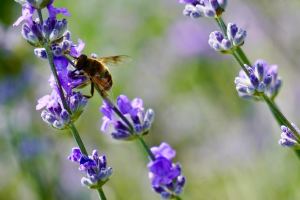
In FY2024, we contributed to seven projects that supported the progress of sustainable agriculture in our suppliers.
- 2023 Organic Lavender Oil, Bulgaria: moved our organic lavender sourcing to regenerative biodiversity-friendly farming while we develop new sources through partnerships in our own project in Lebanon.
- 2023 Camellia Oil, Japan: added a new source native to Toshima Island that actively regenerates island ecosystems.
- 2023 Tagua Nuts, Ecuador: co-funded tagua nursery establishment for rainforest regeneration and agroforestry. Supporting forest communities with sustainable income from non-timber forest products.
- 2024 Lemon and Mandarin Essential Oils, Italy: invested in agroforestry trials in southern lemon and mandarin plots as Mediterranean climates face increasing drought. Testing how agriculture can cool microclimates and build water resilience.
- 2024 Balanites and Marula Oils, Niger: 250 families supported with training in direct seeding drought-resistant Marula and Balanites trees. Providing food, medicine, and income while fighting desertification in a climate-vulnerable region.
- 2024 Coconut Oil, Indonesia: funded 150 Nias Island farmers trained in regenerative polyculture systems, planting coconut trees with vegetables and fruit. Many abandoned conventional agriculture for regenerative practices with organic certification training. 100,000 coconut seedlings distributed to rejuvenate plantations and discourage the move to palm oil.
The magic of healthy farming is that it solves multiple problems at once. Healthier soils store more water, help cool the environment, create climate resilience, and support more biodiversity. Instead of fighting nature, farming can actually help solve the climate crisis. The goal? Turning as many ingredient purchases as possible into an investment in landscapes that are more resilient, biodiverse, and beautiful than when we found them.
Almond oil is one of our most-used ingredients, appearing in everything from conditioners to moisturisers. But conventional almond farming has a dark side, it is mostly grown in monocultures that strip soil bare, industrial almond orchards are essentially green deserts. We still have a way to go, but have made huge strides in the last years, here are two examples:
Spain’s Desert Fighters: In Andalucia, one of the world’s most desertification-prone regions, our organic almond oil comes from regenerative farms that are growing their way out of drought. These farmers mix rainfed almonds with olives, vines, cereals, and aromatic herbs in biodiverse systems that store water, build soil, and support pollinators. Through the AlVelAl territory project, they’re restoring biological corridors and healing landscapes across Granada and Murcia.
Palestine’s Resilience Farmers: Our fair trade almond oil comes from Canaan, working with over 1,000 farmers across 43 villages in the West Bank. Their “Through the Trees for Life” program gives farmers olive and almond saplings to plant alongside other trees and shrubs, creating agroforestry systems that diversify income and improve soil health. Since 2022, they’ve been training farmers in regenerative practices that bring reciprocity between people, plants, animals, and microorganisms. They engage with farming communities year-round and are committed to long-term partnerships with fair trade principles that ensure transparency, full direct payment, fair prices, and purchase guarantees.
PROTECTING FORESTS
While many of our ingredients have origins in agriculture, another big risk in our supply network are materials that are grown and harvested in forests, the most infamous of which is palm oil and its derivatives. The land pressures of the vegetable oil feedstocks that provide the fatty chain acids for our surfactants, soap bases and emulsifiers have a considerable impact and are the main drivers of the risk of deforestation in our supply network. There is also major risks of corporations stealing land from indigenous communities to develop palm plantations. We’re not convinced that palm oil can ever be truly sustainable and instead are opting to remove it from our supply network rather than trying to achieve transparency in ever muddy waters. Lush have not used palm oil since reformulating our soap bases in 2006, however moving away from surfactants that are made from derivatives of this ingredient is a whole other beast. It takes a careful balance of creative sourcing, rigorous supply network mapping, innovative reformulation and a lot of patience and is still not a goal we have been able to tick off.
In FY2024, we reduced our use of palm-derived ingredients by 10% when we reformulated our shampoo bars with a sodium coco-sulfate base, a palm-free alternative. 46% of our the weight of our raw materials that would normally be derived from palm, has been sourced from a diversity of different plant oil feedstocks.
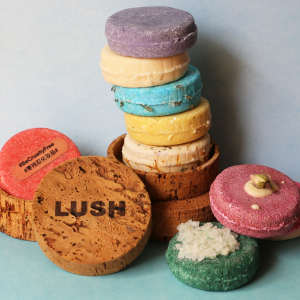
Luckily, global legislation seems to be catching up with us and the incoming EU Deforestation Regulation (EUDR) will introduce mandatory evidence requirements that certain materials being imported into the EU have not come from deforestation-free sources. To ready ourselves for compliance, we have onboarded a new satellite based software called Orbify which will upload GPS data of our ‘deforestation high risk materials’, and layer in land use change over time. This will allow us to ensure none of our materials are sourced from land subject to deforestation, and to mitigate risks of deforestation occurring where there is risk.
We also support forests through the purchase of non-timber forest products and wild harvested ingredients which incentivises communities to keep their forests healthy and safeguard the important habitats that are helping to protect them. Ingredients like Tonka Beans, Murumuru Butter and Illipe Butter help our forest based supplier to get economic value from a standing, thriving forest.
Finally, Through our land defenders fund, we donated £200,000 to those protecting ecosystems with their lives.
reduction in our use of palm-derived ingredients when we reformulated our shampoo bars
The Brazil Nut Oil that we source comes from the Brazil Nut trees of the dense Madre de Dios jungle in Peru. This region is known for its vast biodiversity and its role as a gateway to the southern Amazon.
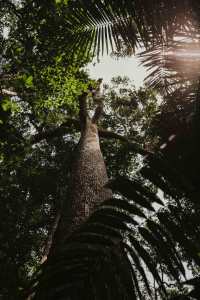
In 2019, Lush took up a 37-year lease on a 2,000-hectare rainforest concession in the Peruvian Amazon, situated along the Las Piedras River in Madre de Dios, spanning 2,000 hectares of land that was once heavily logged. Despite this, the Brazil nut trees, which can grow as tall as 50 meters, have continued to thrive, providing an essential food source for wildlife and offering critical habitat in the forest. This land is strategically located alongside the concessions of other non-governmental organisations (NGOs) and companies who want to protect the Amazon rainforest. This gathering of plots creates a biodiversity corridor, which directly contributes to protecting a wide range of wildlife species and land for the peoples in voluntary isolation in the Amazon. The sale of the Brazil Nut Oil has helped create a sustainable income for local families who are now regenerating the degraded land and protecting the forest from illegal activities such as logging, coca production and mining that threaten the region’s biodiversity.
Spotlight on: Ingredients

Illipe Butter

Murumuru Butter
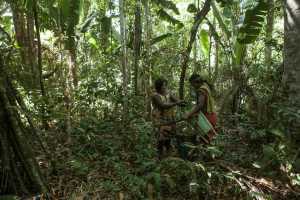
Tonka beans
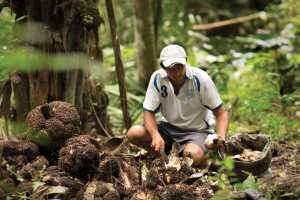
Tagua Nuts
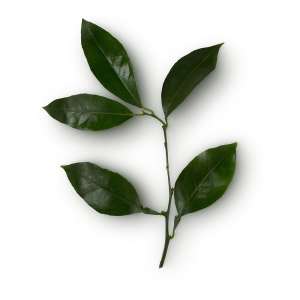
Petitgrain
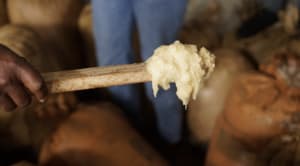
Forest honey

Fir Balsam
Açai Oil
REWILDING LIFE
One last (but not least!) aspect to consider is our impact on wildlife. Through partnerships with conservation organisations, local communities and even our own forest concessions, we source ingredients helping to protect wildlife. We have made significant progress towards our biodiversity monitoring work, to understand how our work to protect forests was impacting wildlife within those locations. This monitoring includes installing camera traps and capturing footage within our key conservation project locations. So far we have witnessed the return of Jaguars, Pumas, Orangutans, Tigers and Pelicans!
17 of the ingredients we buy directly benefit wildlife.
Our love for animals and our desire to protect them is a passion that we share with some of our suppliers and it is truly exciting to contribute towards harmonising with wildlife, rather than working against it. A big chunk of the sea salt that we use in our products comes from salt pans that are connected to bird conservation networks which help migratory birds find safe places to rest, nest and feed. This network includes the Gediz Delta which is home to 10% of the world’s flamingos. Our much loved Dark Sumatran Patchouli Oil comes from the Gayo Lues Permaculture Centre in Sumatera, Indonesia.

This joint venture between Lush and the Orangutan Information Center began in 2015 and is based within the Leuser Ecosytem — an area of forest spanning six million acres of diverse landscape, including intact rainforest, lowlands, montane rainforests, lakes, rivers and peatlands. It is the last place on Earth where Orangutans, Rhinos, Elephants and Tigers co-exist in the wild. The purchase of this oil helps to fund training for farmers on alternative ways to grow and process patchouli that are designed to support the health of Sumatra and Borneo islands’ ecosystems, protecting the primary rainforest and its inhabitants.
SPOTLIGHT ON REWILD LIFE
Simeulue Island, Indonesia – The Last Sanctuary
In the remote waters off Aceh, Indonesia, lies Simeulue Island—the last place on Earth where tigers, rhinos, and elephants still coexist. But it’s the sea turtles that tell the most remarkable conservation story.
When Jane Dunlop arrived after the devastating 2004 tsunami, she discovered pristine islands facing an invisible crisis. Every night, turtle egg poachers were stealing up to 1,500 eggs from nesting beaches – pushing these ancient creatures toward extinction.
The Business-Conservation Model
Dunlop co-founded āluān, our extra virgin coconut oil supplier, working with 500+ farmers committed to biodiversity-friendly growing methods. But the real innovation was creating EcosystemImpact alongside the business – a conservation foundation powered directly by coconut oil sales that proves business and nature can thrive together.
EcosystemImpact funds six dedicated rangers providing 24/7 protection for turtle nesting sites. Since 2016, working with Indonesia’s wildlife protection agency BKSDA, they’ve achieved something extraordinary: zero turtle egg poaching—down from 1,500 eggs stolen per night.
The farmers earn sustainable income from coconut harvests that don’t compete with turtle habitat. The rangers get steady employment protecting beaches their grandparents once raided. And the turtles? They’re finally safe.
Spotlight on: Ingredients
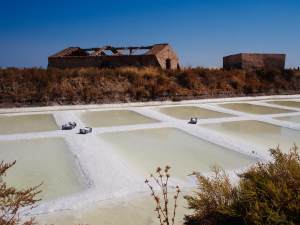
Sea salt
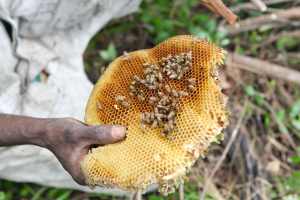
Honey
Tofu
Dark Patchouli

Olive Oil bought from Doga

Sandalwood
Overall, since 2021, through our supply web improvement programme, we have funded 27 environmental projects with suppliers. 4 tree nurseries built, 120,000 seedlings planted, nearly 1000 farmers trained.
Further reading →
12:11







